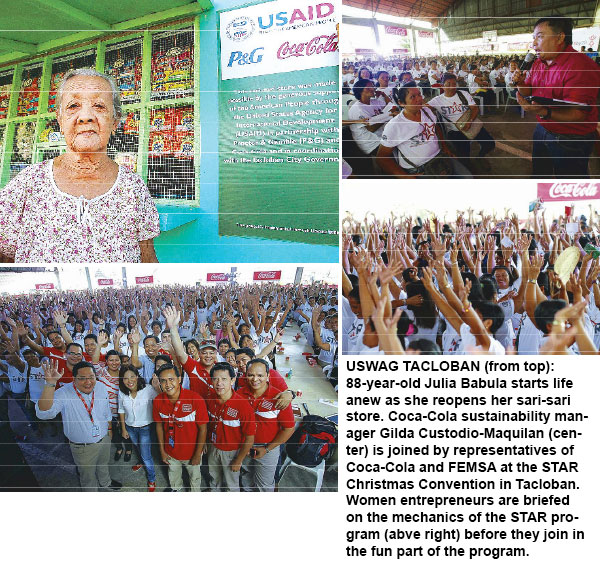Time to flourish
MANILA, Philippines - Asked what she lost when Super Typhoon Yolanda hit, Julia Babula says, “Tanan, tanan… (Everything, everything).” The 88-year-old says all she had left were the clothes on her back. Like most of Tacloban months after the typhoon, she survived on relief goods, lining up wherever they where available.
Since then, Julia has been slowly rebuilding her life, starting with a sari-sari store that USAID, P&G and Coca-Cola helped her set up.
Another beneficiary, Jingkie Lou Octaviano, has been operating her store for two months now. Before that, her family also relied on relief goods and donations. She and her husband then worked for a week on the Tzu Chi Foundation’s cash-for-work program to be able to earn enough to get back on their feet.
Her sari-sari store, she shares, started as just a table at the side of the road. Now, the structure stands tall, with a big new sign declaring KJ’s Store, named after her two children, who thankfully survived Yolanda.
On good days, Jingkie says she earns up to P6,000. The epitome of hardworking families all over Tacloban, Jingkie and her husband have been able to rebuild their house and get their business back up and running.
One year after the super storm, the whole of Tacloban seems to be like Julia and Jingkie – doing their best to restore a sense of normalcy in their day-to-day lives, though remnants of felled trees and roofless houses, clusters of evacuation tents are stark reminders of the storm that will forever be etched in their memory.
The slow but steady progress in Tacloban is due largely to the aid that has come from all over the world, from individuals of all ages to multinational companies and aid organizations.
Coca-Cola was among the companies who immediately came to the aid of Yolanda survivors. With one of the FEMSA Coca-Cola bottling plants located in Tacloban, the safety of their employees was an immediate concern. In the days that followed the typhoon, bottles of soft drinks that survived the wreckage were given out, providing much needed sustenance, especially with the dire lack of potable water.
In the months that followed, Coca-Cola continued to come to the aid of Yolanda survivors with projects including the sari-sari stores in partnership with USAID and P&G.
A year later, they are taking the initiative a step further with their STAR program.
The STAR – or Sari-sari Store Training and Access to Resources – program provides 12-week basic entrepreneurship and gender sensitivity training given by TESDA. The participants then receive products to help stock their inventory, and are eventually connected with microfinance organizations to help them grow their business. It is a long-term sustainable program, spanning a period of three years.
The program has been ongoing since 2012, with a target of reaching 100,000 women nationwide by 2020. It is in line with 5 by 20, the Coca-Cola Company’s global commitment to enable the economic empowerment of 5 million women entrepreneurs by 2020. In each country, women are granted access to business skills training courses, financial services and connections with peers and mentors.
Gilda Custodio-Maquilan, sustainability manager of Coca-Cola Philippines, explains that in the Philippines, they decided to empower sari-sari store owners.
To date Pasay, Manila, Pampanga, Bulacan, Nueva Ecija, Tarlac, Pangasinan, Palawan, Naga, Bacolod, Cebu, Bohol, Iloilo, Aklan, Cagayan de Oro, Davao, Lanao del Norte, Batangas, and Tacloban have been included in the program.
Gilda explains that in Tacloban, the STAR program was done differently. “When Yolanda hit, we knew they needed access to resources immediately,” she says. Thus, the products were provided even before the women underwent TESDA training.
Now that the women entrepreneurs are back on their feet, Coca-Cola continues its STAR program with training and linking up with the microfinance organization, Negros Women For Tomorrow (NWFT).
Janice Apari, who owns a small sari-sari store, is one of hundreds who have signed up for the program. Before Yolanda, she shares, she had a sari-sari store, a canteen-type business at a school and her own multicab. She hopes to regain all these in the coming months.
She looks forward to joining the training seminars because she has no school background in business – she is a Nursing graduate but chose to open her own store because it ensures a daily income for her family’s needs. On a busy day, she earns P7,000.
Though she still remembers clearly climbing to the roof of a school to escape the flood, and she always thinks of her niece who drowned in the flood, Janice now has a more positive outlook about her future.
“Naintindihan ko na rin… nakikita ko sa pamilya at mga kaibigan, nakakabangon na (I’ve come to terms with it… I can see from my family and friends that we’re recovering).”
At a recent gathering in Tacloban for Coca-Cola’s STAR program and Christmas convention, the positive energy was palpable among the women who attended, together with representatives of Coca-Cola, FEMSA, and the NWFT.
As NWFT general manger for operations Shiela Guanzon put it, “Bangon Tacloban” was done. Now is the time for “Uswag Tacloban” – now is the time to flourish, progress and prosper.
- Latest
- Trending


















